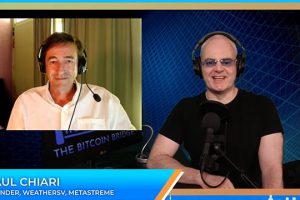Bitcoin and serious big data business: The Bitcoin Bridge talks to Paul Chiari of MetaStreme

Data volumes, data veracity, long-term data security—Paul Chiari is all about data projects on Bitcoin, and he tells us about them in this week’s episode of The Bitcoin Bridge. Find out more about what his work involves, what sort of business problems he’s solving, and how he’s pushing the BSV network to its limits (and beyond).
You won’t hear any talk about “new money” or “being your own bank” here. MetaStreme‘s business is putting lots of data on the blockchain, and processing it in the best ways possible. Paul tells us about how his team have worked to improve efficiency and speed, working together with fellow Aussie company Elas Digital on a recent stress test. Together they’ve been able to find out more about what the current limits are, what records can be broken, where the bottlenecks are, and gain valuable data on how it can be improved.
Many of the limitations they’ve encountered are legacies of the BTC days, he says—on that network, no one really thought much about big data applications so not much was done to improve efficiency there. He invites others working on big data-using applications to contact MetaStreme to help find the most suitable ways to do it.
What sort of processes does this involve? How much interaction is there between MetaStreme, developers and transaction processing operations? Watch the full interview above to find out.
We also look at the ways these data projects are finding their way to BSV. Paul explains that his companies don’t function as typical startups—they’re well established in the IT industry and most of the use cases come from real-world needs they’ve identified over the decades.
It’s not just a matter of “build it and they will come.” Many clients of MetaStreme and WeatherSV come from existing business partnerships and from talking to them about new ways to solve their problems. His location in northern Queensland, Australia, has also meant the projects reflect local industries there: agriculture, (real commodity) mining, and ecological research.
BSV companies can also learn a lot from the business clients they serve, Paul says, and he’s always using that information to come up with new ideas.
Like it or not, there’s a lot of unnecessary waste in the world and “we all need to learn how we can do more with less.” Wherever you stand on individual environmental issues, there are always inefficiencies in systems and competition for natural resources is increasing everywhere.
Bitcoin and its data-processing capabilities can play a valuable role in gaining an advantage, and in finding better ways to manage things. It does this by creating records future generations can verify and trust. Overall, it’s a good conversation about taking blockchain seriously (for a change): no more endless talk about asset price speculation and marketing campaigns, this is nothing but good solid infotech.
The Bitcoin Bridge comes out every Monday on Streamanity and also on YouTube; remember to subscribe to the CoinGeek channel so you don’t miss an episode.
Source: Read Full Article
